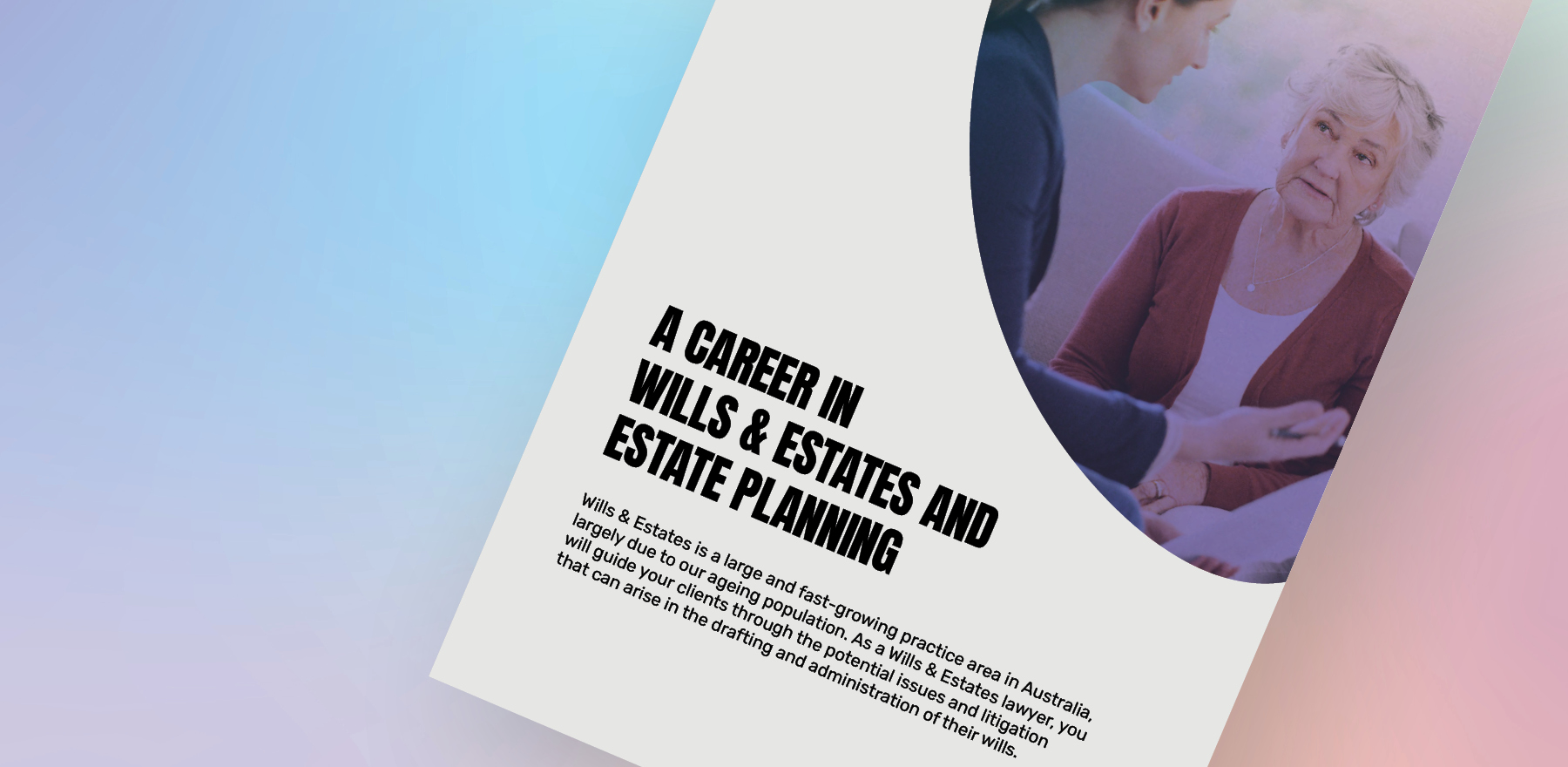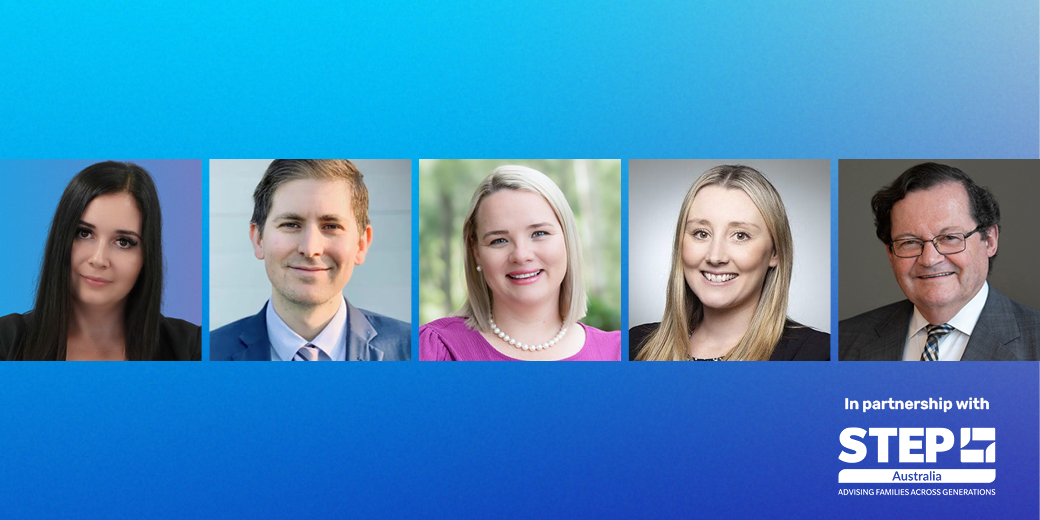Build your career
Options to complete a Graduate Certificate, Graduate Diploma or Masters and advance your career
Advance your expertise
Sharpen your expertise in specific practice areas with practical, real-world focused subjects designed to elevate your proficiency.
A POSTGRADUATE QUALIFICATION GIVES YOU AN EDGE
The College of Law can help you expand on what you already know and acquire new knowledge while providing you with opportunities to hone your skills in a practice area, so that you stand out from the competition.
Open up new career pathways by studying a Graduate Certificate, Graduate Diploma or Master of Laws program. One that’s reality-based, balanced and world-renowned, so you can become the best version of yourself for your client, practice and community.
This is your chance to build career prospects, earn industry recognition, and boost your earning potential.
Curious about where your skills could take you next? Scroll down to explore the variety of practice areas, detailed course subjects, and potential awards waiting for you. Find your perfect fit and tailor your education to your career ambitions.
Intake 3, Starts 11 August 2025 | Intake 4, Starts 10 November 2025
PROGRAM OPTIONS
Select a practice area to explore relevant courses and subjects
PROGRAM OPTIONS - WILLS AND ESTATES
Graduate Certificate in Applied Law
2
Choose any two subjects in your chosen area
A recognised law degree (LLB, JD, or equivalent)
Approx 6 months
Graduate Diploma of Applied Law (Wills and Estates)
4
3 core subjects (WEP1, WEP2, WEP3) and 1 WEP elective subject
A recognised law degree (LLB, JD, or equivalent)
1 year part-time
Master of Laws (Applied Law) majoring in Wills and Estates
8
3 WEP subjects, 4 elective subjects or a second major and the Capstone project in Wills and Estates
A recognised law degree (LLB, JD, or equivalent)
2 years part-time
OR START WITH A GRADUATE CERTIFICATE
Take control of your career
If you decide later to progress towards a Masters, you’ll receive credit towards that award.
WILLS & ESTATES SUBJECTS
WEP00 - Capstone Project (Wills & Estates)
Intake 2, 4TOPICS
THE SUBJECT HAS FOUR COMPONENTS
- Four short answer questions
- Two legal writing samples
- Oral communication (e.g. client interview) assessment held through online conferencing
- Reflective analysis
WEP1 - Foundations of Wills & Estates Practice
Intake 1, 2, 3, 4TOPICS
- Testamentary contracts, mutual wills and estoppel
- Ethics, professional responsibility and liability
- Proof of death and burial
- Formal requirements and the dispensing power
- Taking instructions for and drafting wills
- Essential validity, including testamentary capacity
- Introduction to family provision
- Post-execution: alterations, codicils, republication, revocation and revival
WEP2 - Law and Practice of Estates
Intake 2, 4This subject covers the procedures and principles involved in the administration of estates. It identifies and enables students to apply the legislative provisions relating to testate and intestate estates. It covers the procedural steps for obtaining uncontested grants of probate and letters of administration, including taking client instructions and providing appropriate advice to the client. Students draft applications for grants of probate and letters of administration, as well as administer assets and wind up the estate.
On satisfactory completion of this subject students will understand fundamental theories and practices involved in administration of estates practice, and have an understanding of how to apply this knowledge in professional practice. Students will be able to use and explain this knowledge to specialist and non-specialist audiences. Using practice-based analytical and critical thinking skills, students will be able to apply this knowledge to problem-solving and decision-making in practice.
TOPICS
- Framework for estate administration applications
- Intestacy
- Administration without a grant, small estates and obtaining instructions for estate administration
- Applying for grants of probate and letters of administration and for resealing
- Asset collection, payment of debts and distribution
- Duties and liabilities of legal personal representatives and rights of beneficiaries
- Taxation matters, accounts and commission
- Costing estate matters and managing a wills and estates practice
WEP3 - Construing and Drafting Wills
Intake 1, 3TOPICS
- The court of construction and construction suits
- General principles of construction and construing gifts
- Specific rules of construction
- Admissibility of evidence in the construction of a will Issues in advising on estate planning
- Drafting issues - blended families
- Drafting issues – testamentary trusts and vulnerable beneficiaries
- Lapse of gifts and equitable ademption, satisfaction and election
WEP4 - Family Provision
Intake 2, 4TOPICS
- The family provision framework
- Approach of the court to different categories of applicant
- Commencement of proceedings
- Evidence
- Types of orders
- Other issues impacting family provision
- Mediation and settlement of proceedings, release of rights and compromises
- After mediation: further evidence and the conduct of the hearing
WEP5 - Contested Probate and Other Court Applications
Intake 1, 3TOPICS
- Caveats Solemn form and common form grants; revocation of a grant
- Applications to impugn the essential validity of a will Interim and limited grants - substantive law and procedure and drafting considerations
- Lost wills
- Informal wills
- Statutory will applications - substantive law and procedure and preparation
- Costs, commission and passing of accounts
WEP6 - Advanced Issues in Wills and Estates
Intake 2, 4TOPICS
- Understanding testamentary succession
- Testamentary contracts, estoppel and will making
- Testamentary trusts
- Particular types of gifts and beneficiaries Insolvent estates
- The forfeiture rule
- Delegation of testamentary power
- Wills and estates under foreign law
WEP7 - Elder Law
Intake 3TOPICS
- Introduction to the regulatory framework, delegation and capacity
- Mandatory substitute decision-making
- Financial elder abuse
- Accommodation: Staying at home – carers and assistance Accommodation:
- Staying with the family – granny flats
- Accommodation: Moving out – retirement villages and manufactured home parks
- Permanent residential aged care
- Discrimination and liability
START DATES
| Feb Intake 1 | May Intake 2 | Aug Intake 3 | Nov Intake 4 | |
|---|---|---|---|---|
| START DATE | 10 Feb 2025 | 12 May 2025 | 11 Aug 2025 | 10 Nov 2025 |
| CENSUS | 26 Feb 2025 | 28 May 2025 | 27 Aug 2025 | 03 Dec 2025 |
| END DATE | 02 May 2025 | 01 Aug 2025 | 31 Oct 2025 | 06 Feb 2026 |
| Subject | Start Date | Census | End Date | Workshop Date |
|---|---|---|---|---|
| DRP3 - Advocacy | 22 Sep 2025 | 01 Oct 2025 | 31 Oct 2025 |
15 - 17 October 2025 |
| DRP4 - Mediation | 06 Oct 2025 | 15 Oct 2025 | 14 Nov 2024 |
TBC |
| FDR1 - Family Law and Mediation | 11 Aug 2025 | 20 Aug 2025 | 19 Sep 2025 |
1 - 3 September 2025 NSW/VIC |
| FDR2 - Children’s Matters, Family Law and Family Dispute Resolution | 22 Sep 2025 | 01 Oct 2025 | 31 Oct 2025 |
16 - 18 October 2025 NSW/VIC |
| FDR3 - Advanced Family Dispute Resolution | 05 May 2025 | 14 May 2025 | 13 Jun 2025 |
26 - 28 May 2025 NSW & VIC 24 - 26 November 2025 NSW/VIC |
| FDR3 - Advanced Family Dispute Resolution | 03 Nov 2025 | 12 Nov 2025 | 12 Dec 2025 |
26 - 28 May 2025 NSW & VIC 24 - 26 November 2025 NSW/VIC |
| FDR4 - Case Management in Family Dispute Resolution Capstone | 16 Jun 2025 | 25 Jun 2025 | 25 Jul 2025 |
7 - 9 July 2025 QLD & WA
|
| FDR4 - Case Management in Family Dispute Resolution Capstone | 26 Jan 2026 | 04 Feb 2026 | 06 Mar 2026 |
7 - 9 July 2025 QLD & WA
|
| FDR5 - Virtual Simulated Practice | 08 Sep 2025 | 18 Sep 2025 | 31 Oct 2025 |
Day 1 – 26 September 2025 |
| LB3 - Business Strategy: Planning for Success | 03 Nov 2025 | 12 Nov 2025 | 12 Dec 2025 |
| Subject | Start Date | Census | End Date | Workshop Date |
|---|---|---|---|---|
| FDR1 - Family Law and Mediation | 11 Aug 2025 | 20 Aug 2025 | 19 Sep 2025 |
1 - 3 September 2025 NSW/VIC |
| FDR2 - Children’s Matters, Family Law and Family Dispute Resolution | 22 Sep 2025 | 01 Oct 2025 | 31 Oct 2025 |
16 - 18 October 2025 NSW/VIC |
| FDR3 - Advanced Family Dispute Resolution | 05 May 2025 | 14 May 2025 | 13 Jun 2025 |
26 - 28 May 2025 NSW & VIC 24 - 26 November 2025 NSW/VIC |
| FDR3 - Advanced Family Dispute Resolution | 03 Nov 2025 | 12 Nov 2025 | 12 Dec 2025 |
26 - 28 May 2025 NSW & VIC 24 - 26 November 2025 NSW/VIC |
| FDR4 - Case Management in Family Dispute Resolution Capstone | 16 Jun 2025 | 25 Jun 2025 | 25 Jul 2025 |
7 - 9 July 2025 QLD & WA |
| FDR4 - Case Management in Family Dispute Resolution Capstone | 26 Jan 2026 | 04 Feb 2026 | 06 Mar 2026 |
7 - 9 July 2025 QLD & WA |
| FDR5 - Virtual Simulated Practice | 08 Sep 2025 | 18 Sep 2025 | 31 Oct 2025 |
Day 1 – 26 September 2025 |
TEACHING STAFF











Latest
HAVE QUESTIONS OR READY TO ENROL?
Book a call back with one of our Customer and Student Engagement Advisors

I gained a real insight into the mechanics of wills and estates practice in my first masters.
Chloe Kopilovic, LLM Graduate - Wills and Estates

I graduated six months ago, and since then I've actively sought to implement what I've learned into my day-to-day practice.
Krystal Bellamy, LLM Graduate - Wills and Estates

I’ll never forget what I learned during my education, and the partners who have helped shape the lawyer I am today.
Lav Chhabra, LLM Graduate - Wills and Estates
DISCOVER MORE
Scholarships
If you’re experiencing financial hardship and unable to afford postgraduate study, see if you are eligible for the The Kay Smith Scholarship. This scholarship honours one of the longest serving and most respected people of The College of Law. It is designed to support the education aspirations of outstanding law graduates and young lawyers.
Guide download
Inside the course guide, you will find information on: how this practical program will equip you with the skills and tools you will need, who the course is for, course format, topics and assessment structure, course presenters, workshop dates, prices and how to enrol.
Student success stories
Read how Craig’s postgraduate study accelerated his career by a decade and enabled him to become a specialist and eventually started his own firm.
FREQUENTLY ASKED QUESTIONS
This depends on your workload and your personal situation. If you complete one subject every intake, you could complete your Masters in two years. However, you have five years to complete the course from your intake commencement date.
You can do any of the following without financial penalty any time before the published census date for each intake:
- Withdraw completely
- Change the subject or course you are enrolled in
- Defer it to a subsequent intake (must be within the next 12 months)
As you have five years to complete your Masters, you don’t need to complete a subject every intake. However, if you do not study for two consecutive intakes – then you can apply for a Leave of Absence.
You can only request a leave of absence twice over the course of your studies.
We recommend that you set aside 10-12 hours a week on study per subject, one unit per semester.
Completing two subjects in the same intake may require up to 25 hours of study and readings each week.
There are four intakes a year, February, May, August and November.
You may be entitled to claim your full 10 units per subject for your CPD requirements.
However, you may still need to complete some mandatory CPD units. Please check with your local law society for the requirements in your state or territory.
WA based students may claim up to six units per subject (six CPD units for an intensive subject that has a compulsory workshop requirement or four CPD units for any other subject).
College will lodge the CPD points with the Legal Practice Board on successful completion of the subject(s).
The College’s Credit for Prior Learning Policy encourages practitioners who have completed previous postgraduate and other recognised study to apply for credit towards either the LLM (Applied Law) or the Master of Applied Law (Family Law).
A maximum of three subject credits may be granted towards the Masters awards.
- If you have undertaken a Graduate Diploma of Legal Practice with The College of Law within the last ten years, you may apply to receive up to two elective subjects of unspecified credit
- If you have undertaken a Graduate Diploma of Legal Practice with another provider within the last ten years, you may apply to receive one elective subject of unspecified credit
- If you have undertaken other postgraduate study, such as an LLM or Graduate Diploma of Law, whether you have completed the award or not, you may be eligible to receive credit for that study
- Accredited Specialists may qualify for exemption of the foundations subject and Capstone Project for their area of major
- Applicants who have completed a Legal Practice Management Course within the last 5 years at The College of Law in may receive one subject specified credit
Yes. Many Master of Laws (Applied Law) students choose electives from our Legal Business Management course. Please contact us to learn how.
No. To become a Family Dispute Resolution Practitioner, you will need to:
- Complete the Graduate Diploma in Family Dispute Practice (FRDP) which satisfies six core units of competency
- Seek accreditation with the Commonwealth Attorney-General’s Department
Many students choose to pursue an LLM with a double major in Family Law and FDRP.
For 2025, each subject in our postgraduate programmes costs $4,150, with no GST applicable. Please note that our fees are subject to annual review and may change during your enrolment.
Full payment is required at the time of enrolment each semester, and we accept various payment methods including cheque, Electronic Funds Transfer (EFT), and credit card.
Additionally, if you are an Australian citizen, a New Zealand citizen, or hold a permanent humanitarian visa, you may be eligible to defer your payment through the Australian Government's StudyAssist FEE-HELP scheme.
Yes, if you are an Australian citizen or permanent resident, you may be eligible to receive FEE-HELP. For more information, visit the Australian Government Study Assist website or download the Study Assist FEE-HELP information sheet.
Please note that StudyAssist FEE-HELP is not available for single subject enrolment.
Yes, you can, but Study Assist FEE-HELP will not apply.
Yes. If you are from a non-English speaking country or your previous studies were in a language other than English, you will need to demonstrate your English skills in accordance with the IELTS standard before starting the program. The requisite IELTS standard is at level 8 (writing), 7 (listening), 7.5 (speaking), 7 (reading), and 7.5 overall.
JOIN OUR NEWSLETTER
Sign up to keep up to date with latest news, programs, events and career tips.


































